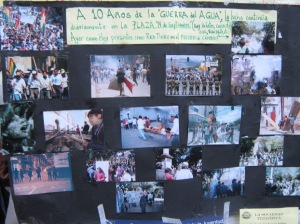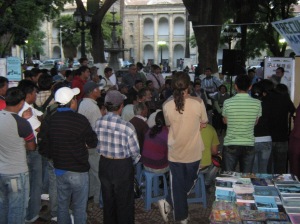Last night [14th April] in the in the Plaza of 14th of September here in Cochabamba we went to the People’s Pre-Summit for the conference. This was organised by Red Tinku, an autonomous local collective who work on a number of fronts including popular education, and who have a daily presence in the square talking with people about issues relating to human rights, the environment, culture and social movements. This event was co-organised with local students from the sociology department, with invited speakers from CODAC, (The Committee for the Defence of the Environment of Cochabamba.)
As well as displays about impacts on the environment, the ozone layer and the problem of rubbish, there was a water engineer and President of CODAC, Maldonado Rojas, talking about contamination of the local river Rio Rocha and its surrounding areas. Following an eight month study, they now have a plan for recuperation of the river including work of sustainable reforestation and reduction of contamination. The river water is highly polluted, they describe it as being permanently black, and this is having health impacts on the surrounding population. It is affecting the crops and even the dairy products.
He also described how the beginnings of the Water Wars was a small group,in the plaza, talking to people and gathering information about price rises, impending privatisation and access to drinking water. The Water Wars, celebrating their 10th anniversary this week, was a popular uprising that spread from here across the country. The people forced out the foreign multinational Bechtel, and in successfully reversing the privatisation of the local water company they in turn prevented massive price rises that would have been untenable for the vast proportion of the population. We found out last night that still only 50% of people living in the area of Cochabamabinos have drinking water. The successes and failures of the publicly owned company, SEMAPA will be debated at the events over the next few days. Read more about the water wars here [http://en.wikipedia.org/wiki/2000_Cochabamba_protests].





No comments:
Post a Comment